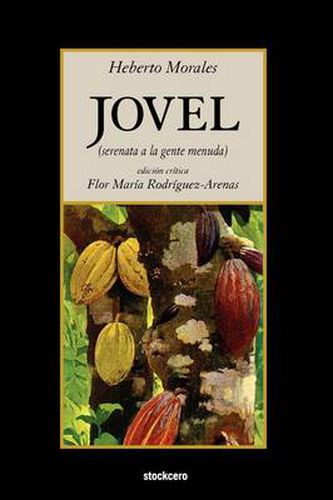Readings Newsletter
Become a Readings Member to make your shopping experience even easier.
Sign in or sign up for free!
You’re not far away from qualifying for FREE standard shipping within Australia
You’ve qualified for FREE standard shipping within Australia
The cart is loading…






This title is printed to order. This book may have been self-published. If so, we cannot guarantee the quality of the content. In the main most books will have gone through the editing process however some may not. We therefore suggest that you be aware of this before ordering this book. If in doubt check either the author or publisher’s details as we are unable to accept any returns unless they are faulty. Please contact us if you have any questions.
Jovel, serenata a la gente menuda is an essential novel in the literary canon of Chiapas, Mexico; not only for belonging to the historic novel genre, but also by bringing out important identity traits for the Chiapas population. The strategies for the composition of this fictional world follow very closely historical documents to relate the circumstances at the departure from the Iberian Peninsula in the XVI century of the Spanish group that colonized, founded and established itself in Ciudad Real de Chiapas (current San Cristobal de las Casas), as well as diverse circumstances of the indigenous Tzotzil people of the old Mayan culture, and the trip they undertook from Guatemala till arriving to the current valley of Jovel in Chiapas. Where up until now they exist and preserve their customs and traditions, that give sustenance not only to their culture, but also provide general characteristics to the Chiapanecan community. As a fictional universe this novel represents with a total mural like zeal the lives of apparently insignificant groups to expand the compression of the past and to give meaning to a present existence, by means of identity characteristics belonging to the people of Chiapas. In the same manner, it presents intertextual techniques of generative assembly; that is to say, its discourses reuse portions, fragments of other authors’ texts, and its discourse is marked by the representation of language stratifications or heteroglossia social, regional, and ethnic.
$9.00 standard shipping within Australia
FREE standard shipping within Australia for orders over $100.00
Express & International shipping calculated at checkout
This title is printed to order. This book may have been self-published. If so, we cannot guarantee the quality of the content. In the main most books will have gone through the editing process however some may not. We therefore suggest that you be aware of this before ordering this book. If in doubt check either the author or publisher’s details as we are unable to accept any returns unless they are faulty. Please contact us if you have any questions.
Jovel, serenata a la gente menuda is an essential novel in the literary canon of Chiapas, Mexico; not only for belonging to the historic novel genre, but also by bringing out important identity traits for the Chiapas population. The strategies for the composition of this fictional world follow very closely historical documents to relate the circumstances at the departure from the Iberian Peninsula in the XVI century of the Spanish group that colonized, founded and established itself in Ciudad Real de Chiapas (current San Cristobal de las Casas), as well as diverse circumstances of the indigenous Tzotzil people of the old Mayan culture, and the trip they undertook from Guatemala till arriving to the current valley of Jovel in Chiapas. Where up until now they exist and preserve their customs and traditions, that give sustenance not only to their culture, but also provide general characteristics to the Chiapanecan community. As a fictional universe this novel represents with a total mural like zeal the lives of apparently insignificant groups to expand the compression of the past and to give meaning to a present existence, by means of identity characteristics belonging to the people of Chiapas. In the same manner, it presents intertextual techniques of generative assembly; that is to say, its discourses reuse portions, fragments of other authors’ texts, and its discourse is marked by the representation of language stratifications or heteroglossia social, regional, and ethnic.